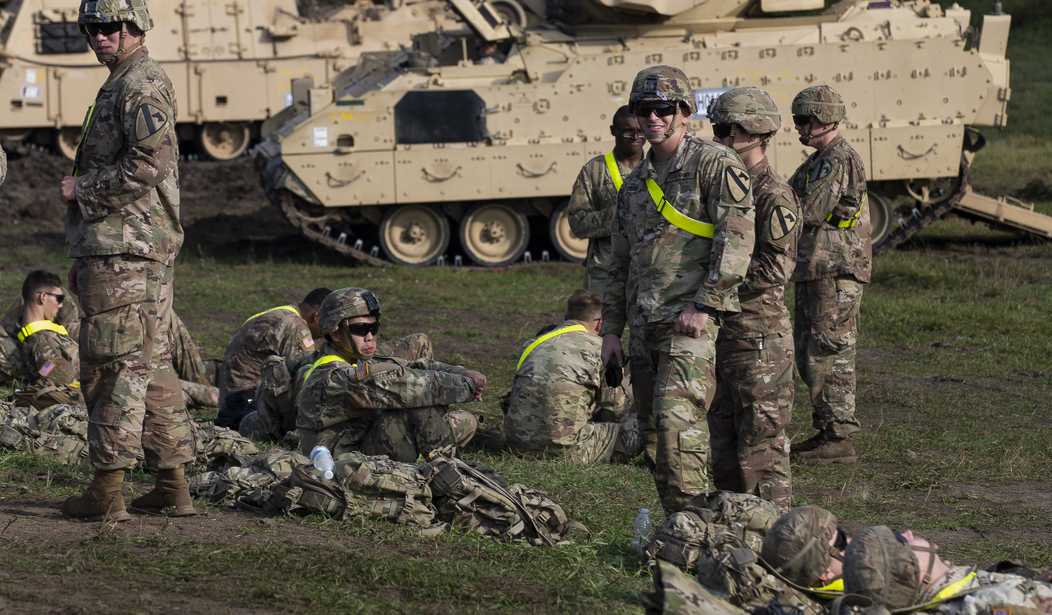Russia’s invasion of Ukraine has been instructive for much of the world in surprising ways. Chief among the facts that have been revealed is the reality that Russia’s military, formerly considered to be a superpower on par with that of the United States, was actually falling apart from the inside and is really only a shell of its former self. Nearly everyone expected the Kremlin to blast into Kyiv in a week or two and eliminate the Ukrainian government. Instead, the Russians have arguably had their butts kicked by a hastily assembled and somewhat ragtag army comprised of many civilians with no combat experience. (Granted, the metric buttload of modern weapons we’ve given them clearly helped.)
But at least one senior flag officer in the American military is taking away a different lesson from current events around the globe and he’s trying to issue a warning before it’s too late. It’s not just Russia that is falling behind in terms of military might. The Commander of U.S. Strategic Command, Admiral Charles Richard, warned during a conference this week that America’s military has fallen behind that of China and may not be ready or able to deliver if “the big one” comes. And according to the Admiral, that could happen much sooner than most people think. (Wall Street Journal, subscription required)
Russia’s invasion of Ukraine revealed the fading power of America’s military deterrent, a fact that too few of our leaders seem willing to admit in public. So it is encouraging to hear a senior flag officer acknowledge the danger in a way that we hope is the start of a campaign to educate the American public.
“This Ukraine crisis that we’re in right now, this is just the warmup,” Navy Admiral Charles Richard, commander of U.S. Strategic Command, said this week at a conference. “The big one is coming. And it isn’t going to be very long before we’re going to get tested in ways that we haven’t been tested” for “a long time.”
How bad is it? Well, the admiral said, “As I assess our level of deterrence against China, the ship is slowly sinking. It is sinking slowly, but it is sinking, as fundamentally they are putting capability in the field faster than we are.”
Reading through all of Richard’s comments, it’s clear that he doesn’t necessarily mean nuclear war when he says “the big one,” though that’s certainly on the table these days. The phrase could really be applied to any significant challenge to American military supremacy, including on conventional battlefields.
And the way the Russian invasion “revealed the fading power of America’s military deterrent” is the conclusion that Russia had no fear of an American military response to the invasion. Part of the Kremlin’s calculations may have been based on our current leadership and Joe Biden’s perceived temperament. But even if Biden were some sort of war hawk, we are not in shape to deploy our forces in a sustained battle on the other side of the world with any assurance of victory.
The Admiral believes that the only part of our military forces where we retain a decided advantage over our adversaries is our submarine fleet. But even that advantage won’t last for long if we don’t continue to upgrade our assets. He suggests we build three new Virginia-class fast-attack submarines per year for the next several years. But other assets will have to be developed and deployed quickly. We have fallen behind China in the race to develop hypersonic missiles and we are already lagging far behind them in military satellite technology. Our ground forces, ranging from tanks to ground-based missile systems require upgrades and replenishment as well.
All of this will take money that members of Congress will be hesitant to approve. But do we really have a choice? An honest, serious conversation with the American people will be required (in the Admiral’s opinion) to convince everyone that this is not an optional investment unless we want to withdraw from the world stage almost entirely and allow another nation – likely a very autocratic adversary – to take the reins.
Assuming you take Admiral Richard at his word and find him credible, the same analysis described with Russia could be applied to China. The situation across the Taiwan Strait is particularly tense at the moment and we can no longer simply assume that China won’t invade because they fear an American military response. China’s leaders probably believe that they could beat us in a conventional land and sea battle that close to their own shores if push came to shove. And they don’t fear us launching a first nuclear strike. They’re likely correct in both of those assumptions, so Congress and the White House probably need to start working on this problem yesterday.








Join the conversation as a VIP Member